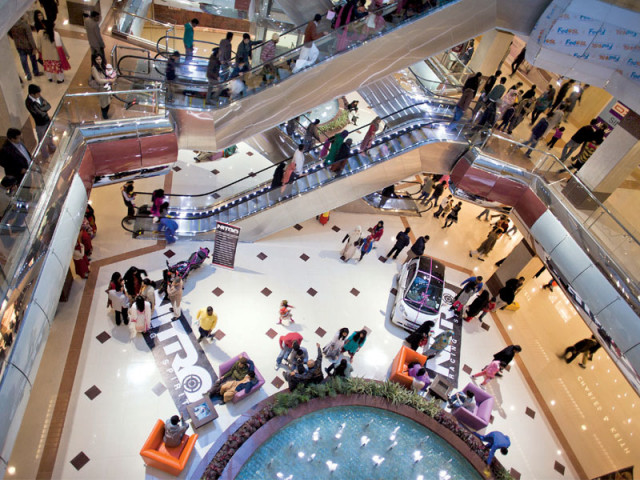In Punjab, new shopping malls influence business trends
Developers aiming to introduce such malls all over the province to attract customers.

A view of the newly opened mall in Islamabad. PHOTO: MYRA IQBAL/EXPRESS
The increasing numbers of shopping malls popping up all over large cities in Pakistan are creating opportunities not only for large retailers, but also the smaller ones previously involved in doing business in traditional, less profitable ways.
The abundance of centralised shopping areas has led to a change in the social aspect of shopping: shoppers who previously frequented open markets now head to malls for a one-stop shopping experience. Such shopping malls also create a flaming aura of glitz and glamour, attracting wealthy customers like moths and encouraging them to spend from their wealth, helping many businesses grow.
Lahore, the provincial capital of Pakistan’s most populous province, has a number of malls that cater to all imaginable clothing needs under one roof, making it easy for customers to find all they require in one place. Whereas people previously headed to unorganised shopping centres and renowned open markets for their clothing needs, such shopping districts rarely housed branded goods, and offered limited choices for customers as far as quality was concerned. The few big names in the clothing industry were considered too posh for the common customer. The shopping mall has changed all that.
An influx of new domestic and international brands in the market over the past few years has created a need for well-equipped shopping malls where they can all be housed together. Industry insiders estimate that around 150 high end brands sell their goods in different cities in Pakistan, out of which 30% do not have formal outlets of their own and rely on such malls for sales.

Pace Pakistan introduced Lahore to the concept of shopping malls before the turn of the century, and it remains one of the most recognised names among savvy shopaholics of the city. The group is currently operating four malls in Lahore, one in Gujranwala and one in Gujrat. Other groups have entered the fray, with Bahria Town introducing its state-of-the-art Mall of Lahore.
“These shopping malls are proving a lifeline for new and existing [clothing] designers and are playing an important part in helping the industry flourish,” Shahzad Mughal, Chief Operating Officer of Urban Elements, said while talking to The Express Tribune. “Many designers have their own outlets in different parts of the city, but with the entry of shopping malls that attract the wealthier crowd, we cannot afford to miss out on the opportunity of displaying our brands there,” he added.
As the average Lahori becomes ever more brand conscious, with the entertainment industry playing a major role in influencing tastes, the city’s denizens have been looking for new things to expend their increased purchasing power on. And they are still relatively happy to experiment.
“I am not a designer, but I somehow managed to open a fashion outlet by hiring a few traditional tailors,” said Nadeem Ali, who has been involved in the garments business in one of the Pace shopping malls for quite a few years now. “This mall has provided me with a lot of opportunities. I used to import garments in the past, but then I decided to design my own clothing line to improve my business,” he added.
A few groups are now realising the potential in this relatively unexplored area, and wish to take the concept of shopping malls to cities which have erstwhile been neglected. Some, like Pace Pakistan and the Chenab Group, have already established a presence in regional cities, while others plan to march on southern Punjab and capture important cities there.
“We have just announced a shopping mall in Multan, and half of our mall has already been booked by famous brands for outlets and food courts,” Ali Zubair, general manager development of Pearl Real Estate Holdings, told The Express Tribune. “Investors normally think of potential in megacities only, but people of the smaller cities also want to spend money in classy malls. With such malls, not only will we introduce a new lifestyle to the city, but also create opportunities for small and medium scale retailers to expand their businesses,” Zubair added.
Published in The Express Tribune, May 19th, 2013.
Like Business on Facebook to stay informed and join in the conversation.



















COMMENTS
Comments are moderated and generally will be posted if they are on-topic and not abusive.
For more information, please see our Comments FAQ